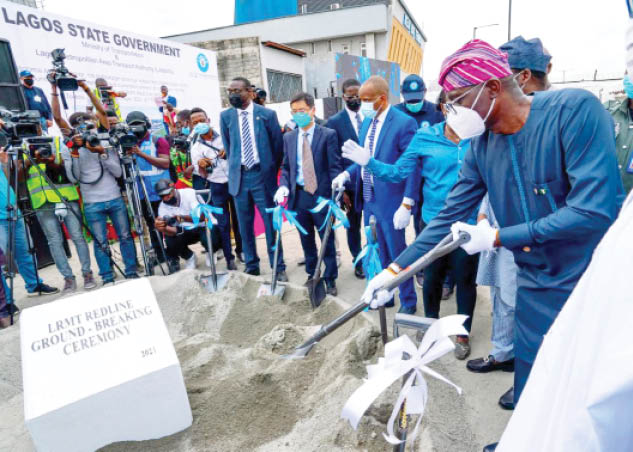Sanwo-Olu launches Lagos rail project
Governor Babajide Sanwo-Olu of Lagos State on Thursday performed the groundbreaking for the first phase of the Lagos Rail Mass Transit (LRMT) Red Line project to improve mobility, promote economic growth and enhance the living conditions of the people. The construction of infrastructure for the standard gauge Red Line which would share tracks with the […]

Lagos State Governor, Mr Babajide Sanwo-Olu performing the ground breaking ceremony of the Lagos Rail Mass Transit Red Line Project at Ikeja on Thursday
Governor Babajide Sanwo-Olu of Lagos State on Thursday performed the groundbreaking for the first phase of the Lagos Rail Mass Transit (LRMT) Red Line project to improve mobility, promote economic growth and enhance the living conditions of the people.
The construction of infrastructure for the standard gauge Red Line which would share tracks with the Lagos-Ibadan Railway Modernisation Projects is divided into two phases. The Red Line is a 37-kilometre railroad with 12 proposed stations.
- NAFDAC intercepts truck conveying banned medicines, vaccines in Delta
- Rainstorm wrecks havoc in Kwara
According to the governor, the first phase will cover Oyingbo to Agbado with nine stations. Three of the stations will be constructed with the Lagos – Ibadan Railway Modernisation Projects by the federal government at Agbado, Agege and Ebute Metta Junction.
The remaining six would be constructed as independent stations at Iju, Ikeja, Oshodi, Mushin, Yaba and Oyingbo.
Phase two, which would be mostly elevated, would have stations at Iddo and Ebute-Ero before terminating at Marina where a huge interchange is planned to manage commuters on the Red, Green and Blue Rail lines, BRT buses and those using the waterways.
He said the Red Line would move its first passenger in the fourth quarter of 2022 as the state works towards bringing the first phase of the Blue Line to passenger operation by the fourth quarter of 2022.
“The implementation of the Red line project has become very elevated because of the financing package put in place for it by the state government through the Central Bank Nigeria (CBN) Differentiated Cash Reserve Requirement (DCRR) programme,” he said.
The governor also presented cheques as compensation to those whose property, businesses and accommodation would be affected by the project, and have been verified.
